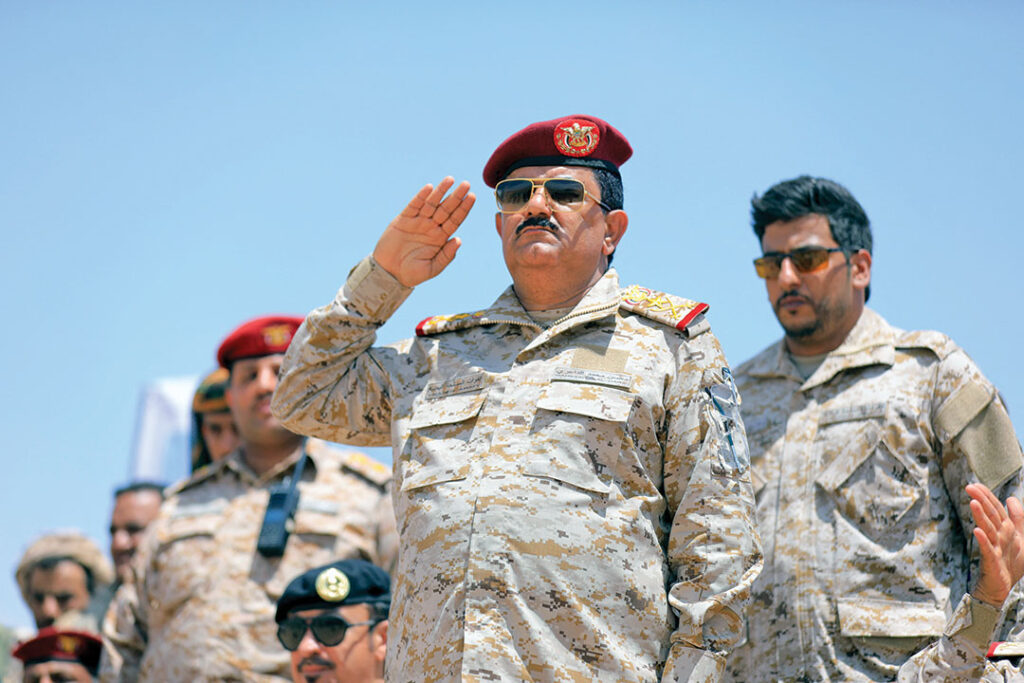BRIG. GEN. PILOT FAISAL AL-JUMAI, YEMENI SENIOR NATIONAL REPRESENTATIVE TO U.S. CENTRAL COMMAND
As a brigadier general commanding Yemen’s 14th Armored Brigade in the province of Marib, Mohsen Mohammed Hussein Al-Daeri took a Houthi bullet in the arm during the battle of Nasr 1 in September 2016.
His success in leading combat troops against rebel militias in vital areas of the country earned him a promotion to Yemeni minister of defense in 2022 with a bump in rank to lieutenant general.
Lt. Gen. Mohsen finds himself on the front lines again as the Houthis and their Iranian backers expand the Yemeni conflict by attacking cargo ships in the Red Sea that are crucial to the global economy.
The general insists that with the right support — in training and equipment — his military forces can overcome Houthi resistance and weaken Iranian expansionism. Yemen’s legitimate government has pursued cease-fires and peace agreements sponsored by United Nations to try to end the crisis that has harmed millions of Yemenis. But, the Houthis have refused to adhere to their side of the bargain.
“We have capabilities and practical experience in the Yemeni Armed Forces in the form of officers and other personnel in the Yemeni navy, coastal defense forces, and coast guard. These stand ready to carry out operations once they have been equipped with the necessary weapons and other resources and have the material support needed to operate them,”
Lt. Gen. Mohsen told Unipath.

“This will put them in a state of high combat readiness where they will be able to effectively contribute to multinational efforts, especially given their expertise and previous experience in defending and securing coasts and waterways, in addition to their ability to operate from bases within their own territory.”
Lt. Gen. Mohsen hails from the Dhale governorate in the southwest corner of Yemen. He graduated from the military college in Aden in 1985 and assumed his first position as platoon commander in an armored infantry battalion. Within four years, after his superiors noted his talent for planning and operations, he advanced to battalion staff officer.
Beginning in 2000, he spent 10 years as an air defense officer in the country’s northwest region. When the Houthis rose up against the Yemeni government in 2014, Lt. Gen. Mohsen found himself immersed in fighting as commander of the 14th Armored Brigade in Marib. He rose to become chief of staff of the Yemeni Armed Forces in 2019. Three years later came his promotion to defense minister.
Situated on the Red Sea, Bab El Mandeb and Gulf of Aden, Yemen is eager to increase its contribution to regional and global stability by helping secure coasts and waterways, Lt. Gen. Mohsen said. He pinpointed training and equipment needs for the Yemeni naval forces and coast guard: radar systems to perform coastal surveillance and better boats and communications equipment to conduct towing, interdiction and rescue operations.
The international community could further aid Yemen by deterring Iran from violating embargoes meant to stop arms smuggling to the Houthis, he said.

“Other essential elements that the legitimate armed forces lack is air forces and air defenses. These were lost in the war,” the defense minister said. “This deficit has been felt keenly as the militias came into possession of numerous means of aerial attack such as drones and missiles. Yemen’s legitimate forces need assistance to protect their forces and vital facilities from these attacks.”
Yemeni civilians have suffered abuse at the hand of Houthis in the areas they occupy. In addition to the support the terrorist group receives from Iran, the Houthis have used violence and oppression against the people of Yemen to extract money.
“The group has exploited the economic and military resources and capabilities of the Yemeni state, plundered state property, and extorted merchants, financiers and businessmen by forcing them to pay heavy taxes and other levies under a variety of pretexts,” Lt. Gen. Mohsen said. “All these factors have helped this seditious group in its war against the Yemeni people.”
The general credits Saudi Arabia for helping sustain the legitimate government during the 10-year conflict. He cited the Saudi-led Coalition to Restore Legitimacy in Yemen for helping his forces liberate territory from the Houthis. Saudi charitable organizations have built schools, hospitals, electrical lines and other needed infrastructure.
The United Nations has supplied food and medicine that has softened the blow of the humanitarian crisis in Yemen. It has also sponsored cease fires and peace agreements in the name of restoring calm to the devastated country.
“We have great hopes for achieving peace in Yemen,” Lt. Gen. Mohsen said. “However, our repeated experiences with the Houthi group confirm to us that they don’t respect any agreements and do not work in good faith toward peace. Rather, they exploit any talks to catch their breath and regroup and try to seize any advantages they can get through negotiations.”
Lt. Gen. Mohsen called for firmer resolution from all parties — including regional and global powers and the United Nations — to pressure the Houthis and Iran and prevent them from destabilizing the region.
“The international community must support the legitimate government in Yemen and its armed forces in confronting the seditious and terrorist Houthi group,” the general said. “It must also enforce international laws and resolutions against Iran, which is arming the Houthis with weapons and ammunition.”

